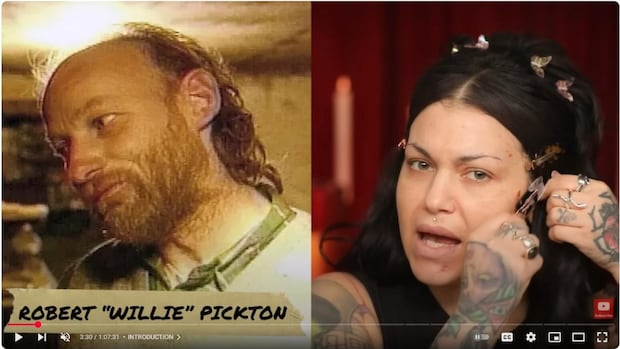Beauty influencers are now incorporating true crime into their make-up video content.
Every Monday on her channel, YouTuber Bailey Sarian posts videos of her doing her full make-up routine in a “get ready with me” style, while she recounts the details of a real, notorious murder mystery case.
Last week, she made a video about Robert Pickton, the Canadian man who died in prison while serving a life sentence for six counts of second-degree murder. He was charged with murdering 26 women in B.C., and remains or DNA of 33 women — many who were Indigenous — were found on Pickton’s Port Coquitlam, B.C., pig farm.
Today on Commotion, culture critics Amil Niazi and Riley Yesno join guest host Ali Hassan to discuss the trend and what it says about our relationship with true crime today.
WARNING: This conversation deals with difficult subject matter, including violence against Indigenous women.
We’ve included some highlights below, edited for length and clarity. For the full discussion, listen and follow Commotion with Elamin Abdelmahmoud on your favourite podcast player.
WATCH | Today’s episode on YouTube:
Ali: Last week, [Bailey Sarian] talked about the case of Canadian serial killer Robert Pickton…. Riley, how gruesome is this case and, given that, what was it like to watch her video?
Riley: It was rough at times. I know that there are obviously the very immediately impacted families of the victims in this case, but Robert Pickton in particular is, I think, a case that, for Indigenous people in Canada, has become synonymous with the larger crisis of murdered and missing Indigenous women and girls. And so it’s something that is brought up … in very serious contexts, in times of immense grief. And so, it is weird to see, like, ads for her sponsor kind of in the mix of that. And it gets to the point where I think that, we can talk about crime, but are we doing it in a trauma-informed way? Are we doing it with integrity? Are we doing it for a purpose that is about information, and education and honesty, as opposed to just entertainment and commercialization? I think that’s a very important line to have established.
Ali: Yeah, and I think it’s very interesting … hearing that, and the way we’ve been talking about this story, it does seem like it would feel very insensitive to many people. The very surprising thing is when you scroll through the comments, it’s incredible how much of it is overwhelmingly positive. You have people weighing in about the connections they had to the case. People saying, “I lived down the street from him. I knew a victim. Thank you for covering this. I’ve been waiting years for you to cover this and share this story.” What do you make of that positivity, Amil?
Amil: I was just getting my start as a young journalism intern when Robert Pickton was arrested, and I actually went down to the farm and was working for CityTV. So I remember being very steeped in the details of this case, and they still sit with me. It’s a very horrific case, but I’m not surprised at all that someone like this, telling this case and really digging into the details in a way that not that many people have done is relatable and is refreshing to commenters. I read a lot of the comments. It was people who had known the family, had known Robert Pickton, had been on the farm. And they have felt, up until now, that no one has really talked about the many more details that they are familiar with in this way. And I think it’s refreshing.
To me, it’s a lot like Jeffrey Epstein. It’s a case that you have heard about for many years. You are familiar with some of the more horrific details. And yet, you still feel like it’s being blazed over, or that there are people involved who are being blazed over, who are getting off scot-free. So I understand why her speaking so bluntly and so casually about it is actually kind of refreshing — because she’s saying things that people have been waiting a long time to hear. And so I think this is, in many ways, the perfect medium for cases like this to be spoken about.
Ali: Riley, what are your thoughts on this?
Riley: I guess this points to, maybe, this half-baked idea I have here, which is that the justice system, I think in general, does a really poor job of creating space for collective healing, right? We’re told a good outcome is a guilty verdict on a charge, which he got, and that’s that, and we’ve done our job when it comes to crime. When in fact, we know that the ripple effects of crimes like this are profound, and they affect not just the immediate victims, but wider communities like the comments are really alluding to. And so do I think true crime podcast makeup and murder is the way to do it? Maybe not, but do people need a space to be able to talk about it, to be heard, to feel like they can share these details? Absolutely. And it’s something that as a society at large, we really fail to do. And I think true crime and mediums like this are just filling in that gap that is actually really important, I think, to a sense of collective healing amongst people — which I didn’t think I would associate with this video necessarily, but is the idea, the thread.
You can listen to the full discussion from today’s show on CBC Listen or on our podcast, Commotion with Elamin Abdelmahmoud, available wherever you get your podcasts.
Panel produced by Nikky Manfredi.



